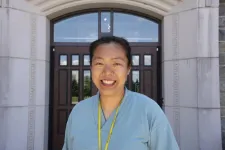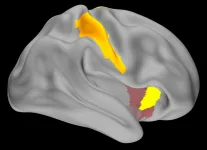Preventing plant disease pandemics
2021-06-08
(Press-News.org) During the COVID-19 pandemic, food systems faced disruptions from staff shortages and supply chain issues. Now, a Virginia Tech researcher is assisting with efforts to help plants themselves from facing their own pandemic.
Just like human diseases, plant diseases don't have arbitrary boundaries. These diseases don't stop at a border crossing or a port of entry. That's why plant disease surveillance, improved plant disease detection systems, and predictive plant disease modeling - integrated at the global scale - are necessary to mitigate future plant disease outbreaks and protect the global food supply, according to a team of researchers in a new commentary published in "Proceedings of the National Academy of Sciences."
"The manuscript offers a unique and timely perspective on plant diseases, particularly in the context of the COVID-19 pandemic," said David Schmale, a co-author on the paper and a professor in the Virginia Tech School of Plant and Environmental Sciences in the College of Agriculture and Life Sciences. "What would happen if the world lost a staple crop, such as wheat, to a plant disease pandemic? The manuscript considers current tools and capabilities in the context of climate change and growing human populations. There is a clear opportunity to bring researchers together that work on the epidemiology of human diseases and plant diseases."
Schmale was a part of a team of experts, led by North Carolina State University, that met in Raleigh, North Carolina, a few years ago to discuss plant diseases and their impacts on food security. This manuscript is the result of that meeting, and many of the experts that were there in Raleigh are co-authors on the paper.
The idea is to "detect these plant disease outbreak sources early and stop the spread before it becomes a pandemic," said Jean Ristaino, William Neal Reynolds Distinguished Professor of Plant Pathology at North Carolina State University and the paper's lead author. Once an epidemic occurs, it is difficult to control, Ristaino said, likening the effort to the one undertaken to stop the spread of COVID-19.
Ristaino said that the efforts from a wide range of scholars - so-called convergence science - are needed to prevent plant disease pandemics. That means economists, engineers, crop scientists, crop disease specialists, geneticists, geographers, data analysts, statisticians, and others working together to protect crops, the farmers growing crops, and the people fed by those crops.
While some diseases are already under some sort of global surveillance - such as wheat rust and late blight, an important pathogen that affects potatoes and caused the Irish Potato Famine - other crop diseases are not routinely monitored.
A new strain of the fungal pathogen that causes wheat rust turned up in 1999 (Ug99) and has moved quickly throughout Africa, recently flying over the Red Sea into Yemen.
Globalization of food trade is another factor for the jump of plant pathogens and further risks a food supply already strained by a growing world population and human diseases.
Research is underway to model the risk of plant-pathogen spread and help predict and then prevent outbreaks, the researchers report in the paper. Modeling and forecasting disease spread can help mobilize mitigation strategies more precisely to stop these plant pandemics.
"Our work extends the concept of One Health to plant disease pandemics and the threat they pose to global food security," Schmale said. "People, domestic animals, and plants are all tightly connected through each other and the environments that they share. These connections are changing, and we must address the threat of high-risk plant pathogens to staple food crops to safeguard global food security."
INFORMATION:
[Attachments] See images for this press release:

ELSE PRESS RELEASES FROM THIS DATE:
2021-06-08
That internal nagging feeling that drives you to seek sleep at night and wake in the morning to eat, work, and play, is, it turns out, genetic, and it's not just in people. Nearly every living organism - from animals to plants as well as several microorganisms and fungi - has an internal body clock, or a circadian rhythm.
Yet, scientists have been perplexed out how these genes operate. Now, Virginia Tech scientists have taken a step closer to an answer thanks to the DNA of a mouse, a petri dish, and much patience. In a new study published in the journal Genes & Development, Shihoko Kojima, an assistant professor in the Department of Biological Sciences, part of the
Virginia Tech College of Science, ...
2021-06-08
In a study of healthy volunteers, National Institutes of Health researchers have mapped out the brain activity that flows when we learn a new skill, such as playing a new song on the piano, and discovered why taking short breaks from practice is a key to learning. The researchers found that during rest the volunteers' brains rapidly and repeatedly replayed faster versions of the activity seen while they practiced typing a code. The more a volunteer replayed the activity the better they performed during subsequent practice sessions, suggesting rest ...
2021-06-08
Last year, Anupam Mazumdar, a physicist from the University of Groningen, jointly proposed an experiment together with colleagues from the UK that could conclusively prove whether gravity is a quantum phenomenon. This experiment would focus on observing two relatively large, entangled quantum systems in free fall. In a new article, published on 4 June in Physical Review Research, the scientists describe in more detail how two types of noise could be reduced. They suggest that quantum interference could be applied in the production of a sensitive instrument that could detect movements of objects ranging from butterflies to burglars and black holes.
Is gravity a quantum phenomenon? That is one of the major outstanding questions ...
2021-06-08
CORVALLIS, Ore. - Since the end of the long-running conflict in Colombia, large areas of forest have been rapidly converted to agricultural uses, suggesting the peace agreement presents a threat to conservation the country's rainforest, a new study from Oregon State University shows.
In 2016, Colombia officially signed a peace agreement ending the country's six-decade civil war, which mainly took place within the Andes-Amazon region, an extremely biodiverse rainforest and a critical biological corridor.
Some deforestation was expected after the peace accord was reached, but an analysis of 30 years of land transfers - a term used to describe changes in control and use of a parcel of land - showed a 40% increase in conversion from ...
2021-06-08
Mining involves moving a lot of rock, so some mess is expected. However, mining operations can continue to affect ecosystems long after activity has ended. Heavy metals and corrosive substances leach into the environment, preventing wildlife and vegetation from returning to the area.
Fortunately, this damage can be reversed. A team of scientists, including UC Santa Barbara's Dave Herbst, investigated how river ecosystems respond to remediation efforts. The team combined decades of data from four watersheds polluted by abandoned mines. It took creative thinking to simplify ...
2021-06-08
Researchers at the University of Illinois Chicago have developed a novel continuous-flow microfluidic device that may help scientists and pharmaceutical companies more effectively study drug compounds and their crystalline shapes and structures, which are key components for drug stability.
The device consists of a series of wells in which a drug solution - made up of an active pharmaceutical ingredient, or API, dissolved in solvent, such as water - can be mixed with an anti-solvent in a highly controlled manner. When mixed together, the two solutions allow for the API crystals to form a nucleus and grow. ...
2021-06-08
According to estimates from the Children's Bureau, an agency within the U.S. Department of Health and Human Services, there were 673,000 children in or entering foster care in the United States in 2019.
Data from the Minnesota Department of Human Services say that approximately 15,300 children experienced foster care in 2019. Minnesotan children of color were overrepresented compared to the general population, with Native American children 18 times more likely and Black children three times more likely to experience foster care than white children.
Most children in the foster care system have medical and dental coverage through Medicaid. However, despite ...
2021-06-08
MELVILLE, N.Y., June 8, 2021 -- The COVID-19 pandemic created numerous changes and challenges for many people. In the education field, teachers were asked to re-create lesson plans and student interactivity in a virtual realm, something many had never experienced.
During the 180th Meeting of the Acoustical Society of America, which will be held virtually June 8-10, Andrew Morrison, from Joliet Junior College, will reveal lessons learned by educators during remote teaching caused by the pandemic and what techniques they can use in the return to classroom instruction. The session, "Lessons learned teaching through a pandemic and looking forward to a post-COVID-19 classroom," will take place Tuesday, June 8, at 1:45 p.m. Eastern U.S.
Morrison ...
2021-06-08
MELVILLE, N.Y., June 8, 2021 -- Due to strict lockdown measures around the globe during the coronavirus pandemic, many of us have seen and heard our family members and neighbors much more than ever before. Accordingly, many of us have been more annoyed by the sounds of our household than ever before.
During the 180th Meeting of the Acoustical Society of America, which will be held virtually June 8-10, Ayca Sentop Dümen and Konca Saher, from the Turkish Acoustical Society, will discuss the effects of pandemic-related noise on people's satisfaction with their homes and how this information can help inform future design choices. Their presentation, "Noise annoyance in dwellings during the first wave of Covid-19," will take place Tuesday, June ...
2021-06-08
ROCKVILLE, MD, USA - June 8, 2021 - The PfSPZ malaria vaccines of Sanaria Inc. are unique in vaccine development as they are composed of weakened (attenuated) forms of the live parasite cells that cause malaria. These parasite cells are called eukaryotic cells and there are no vaccines against any infectious disease composed of such cells. Furthermore, there are no licensed vaccines against any infectious disease caused by a eukaryotic pathogen. Thus, Sanaria and its collaborators have had to take a step by step empirical approach to optimizing immunization with PfSPZ vaccines to achieve a safe, effective, durable, and broadly protective malaria vaccine.
Two recent landmark malaria vaccine studies ...
LAST 30 PRESS RELEASES:
[Press-News.org] Preventing plant disease pandemics







